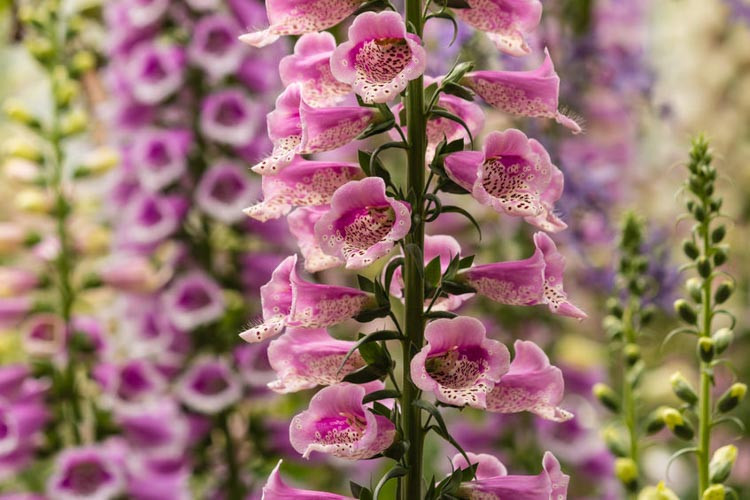Digitalis
Digitalis, commonly known as foxglove, is a genus of around 20 species of herbaceous perennials, shrubs, and biennials belonging to the Plantaginaceae family. These plants are native to Europe, western Asia, and northwestern Africa.
Foxgloves are known for their striking, tall spires of tubular, bell-shaped flowers. They are a popular choice for cottage gardens, woodland gardens, and mixed perennial borders due to their eye-catching appearance and ability to attract pollinators like bees and hummingbirds.
Description and Growth Habit: Foxgloves have a clumping growth habit, forming a rosette of leaves at the base with tall, erect flower spikes emerging from the center. The leaves are typically lance-shaped, and the margins can be smooth or slightly toothed. The flowers, arranged along the spires, have a characteristic bell shape with speckled, colored throats that guide pollinators to the nectar source. They come in shades of pink, purple, white, and yellow.
Blooming Season: Foxgloves typically bloom from late spring to mid-summer, with some varieties blooming into early fall. The blooming period can last for several weeks, and deadheading spent flowers can encourage further blooming.
Size: Digitalis plants can vary in size, with most species reaching heights of 2 to 5 feet (60-150 cm) and a spread of 1 to 2 feet (30-60 cm). Some species, such as Digitalis purpurea, can grow even taller, reaching up to 6 feet (180 cm) in height.
Hardiness: Foxgloves are generally hardy in USDA zones 4 to 9, depending on the species. They can tolerate a range of temperature conditions but prefer moderate climates without extreme heat or cold.
Uses: Foxgloves are primarily grown for their ornamental value in gardens, where they provide vertical interest and attract pollinators. The plants have also been used medicinally, as the cardiac glycosides they contain can be extracted and used in the treatment of heart conditions.
Toxicity: All parts of the foxglove plant, including the leaves, flowers, and seeds, are highly toxic if ingested.
Deer and Rabbit Resistance: While no plant is entirely deer or rabbit-proof, foxgloves are considered relatively resistant to these animals, as their toxicity makes them unpalatable.
Foxgloves are a captivating addition to any garden, with their tall, vibrant flower spires and ability to attract pollinators. While they are undeniably beautiful, it’s crucial to remember their toxicity and handle them with care.

